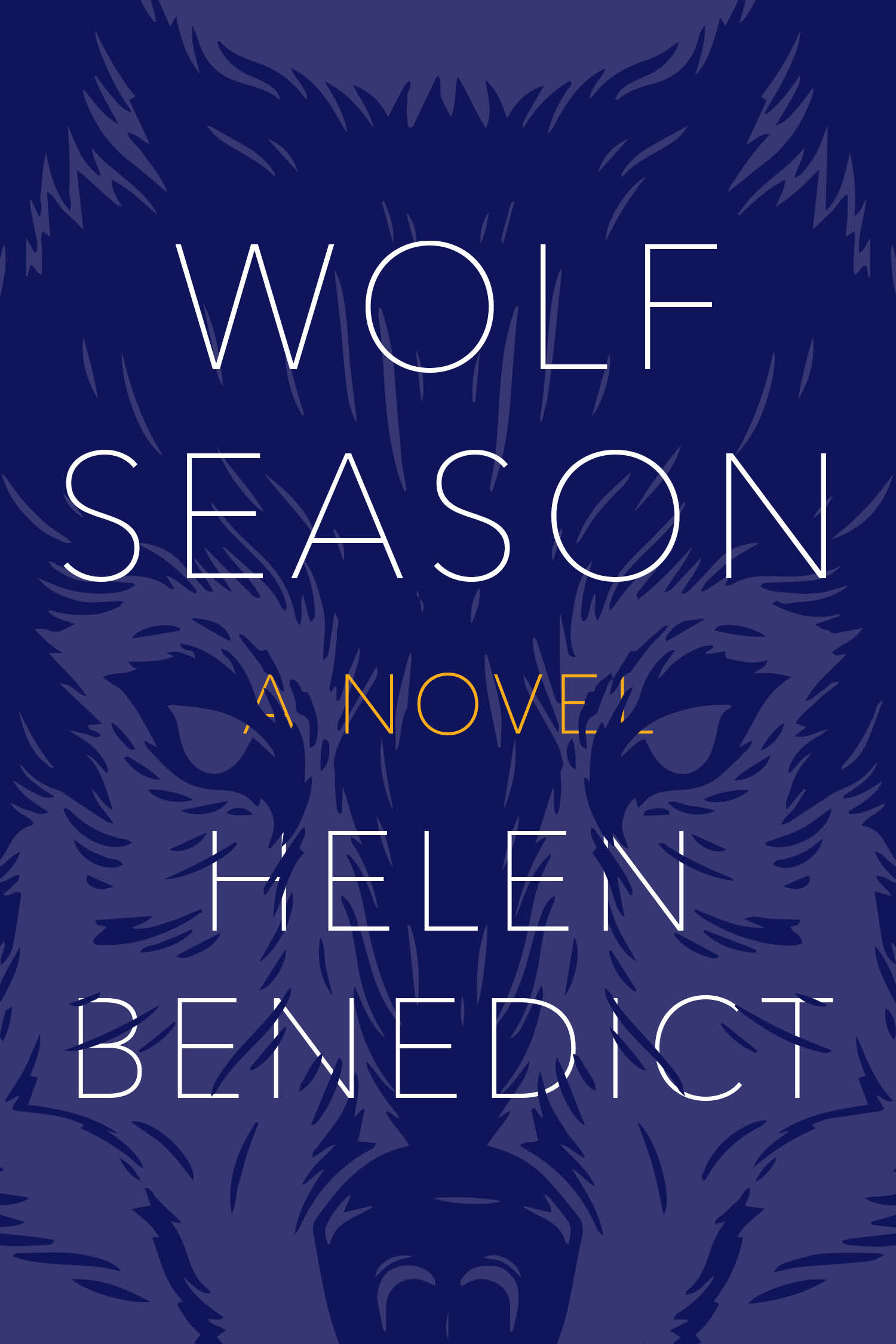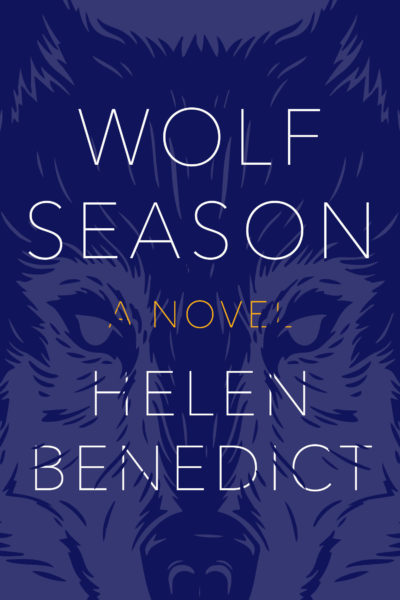In her latest novel Wolf Season, Helen Benedict tells the stories of three women in a small town in upstate New York coping with the trauma of war—not just the direct experience of violence and death, but also the collateral damage it inflicts on loved ones. Rin is a rape-scarred Iraq War veteran who has returned to her hometown of Huntsville. Naema is an Iraqi refugee who lost her husband during the conflict and now works in the town as a doctor. Beth is a military wife dealing with an abusive husband and a troubled child.
The book’s eponymous wolves are Rin’s. She keeps three of them, illegally, on ten fenced-in acres of her farm, to fulfill a promise she made to her dead husband. Their presence comforts her, and she feels a connection to the wild animals. When she describes them as creatures “who won’t be tamed, won’t be polluted, won’t be used,” or imagines them patrolling the woods “like souls freed from the dead, their thick-furred bodies bold and wild,” Rin seems to be saying something about herself, too—a war survivor whose greatest suffering came at the hands of her male comrades-at-arms, who raped her.
A Columbia journalism professor and the author of twelve books, including seven novels, Benedict has been writing about sexual assault in the armed services for years. (According to the US Department of Defense, about one in three military women has been sexually assaulted, compared to one in six civilian women.) Previously, Benedict tackled this subject in a work of nonfiction—The Lonely Soldier (2011). For Wolf Season, she spent more than three years conducting research, speaking with scores of female veterans and Iraqi refugees. There were times, she wrote in a recent essay for Powell’s Books, when the people she interviewed “would fall silent, hands shaking, eyes filling with tears, unable or unwilling to speak further.” She came to believe that just writing up their stories would not be enough; only fiction would allow her to get at what had been left unspoken in those conversations.
Wolf Season is the second in a planned trilogy of standalone novels about the Iraq War. The first book was Sand Queen (2014), a gritty narrative of combat on Iraq’s front lines, which Benedict told from the perspectives of an American female soldier and an Iraqi medical student—Naema. In that book, Naema’s brother and father were rounded up by US soldiers because of suspicion they were conspiring against coalition forces. (The vast majority of these sorts of arrests—common during the early years of the war—would turn out to be groundless, the result of grudges by neighbors or other false information.) When we meet her again in Wolf Season, Naema has relocated to Huntsville following the death of her husband, an interpreter for the US army, in a bomb blast. Now a doctor, she works at the town’s veterans clinic while she tries to build a new life for herself and her ten-year-old son Tariq, who was maimed by the same explosion that killed his father.

The novel starts with Rin taking her blind nine-year-old daughter Juney to the clinic while a hurricane is descending on the town. When she learns that the doctor—Naema—is Arab, Rin’s post-traumatic stress disorder is triggered: she starts trembling and becomes disoriented, her war memories drowning out her ability to distinguish between past and present.
Beth lives on the other side of that trauma. Her husband Todd, a Marine, has returned home from Afghanistan embittered and volatile. On his first day back, he barks at his wife, “Gimme the fucking keys,” and then tells his son Flanner to “watch TV or whatever the fuck you do with yourself these days.”
Tariq and Flanner are friends and play together by a creek running near Rin’s property. Tariq is mesmerized by the wolves. They indulge his childhood need for magic and myth, and he perceives them as otherworldly creatures—“loyal and wise and beautiful.” At one point, Tariq reads a book that dismisses the animals as “no more than a bundle of instincts.” The boy is distraught. “When he gazes into [the alpha male wolf] Gray’s amber eyes, he sees much more than raw instinct and aggression. He sees a rich and complicated being in there, a being with whom he can speak his secret language, boy to wolf, wolf to boy.” It is a poignant moment in the novel, capturing the alienation and yearning for connection that Tariq—an Iraqi refugee, a disabled child, a fatherless boy—cannot help but feel.
In her essay, Benedict discusses what she describes as a “serious crisis of compassion” among the political leaders now in power and their supporters. When white supremacists rallied in Charlottesville, Virginia, last year, Benedict—who was there—felt that she was witnessing a “colossal failure of imagination” at work. “These white nationalists had clearly never given a moment’s thought to what it is like to be an African American or an immigrant, a Muslim or a Jew, or anyone else they were targeting,” she writes. Like other great art, Wolf Season renders a world that defies such heartlessness, showing us how deeply moved we can be by lives and experiences that bear little resemblance to our own.
Priya Malhotra has been a journalist for over fifteen years in New York City. She writes about contemporary art for Hong Kong-based Asian Art News magazine and has contributed to numerous other publications, including Newsday, Time Out New York, the Times of India, and the Japan Times. Twitter: @writer_priya | Facebook: priya.malhotra.771
- Follow us on Twitter: @inthefray
- Comment on stories or like us on Facebook
- Subscribe to our free email newsletter
- Send us your writing, photography, or artwork
- Republish our Creative Commons-licensed content


